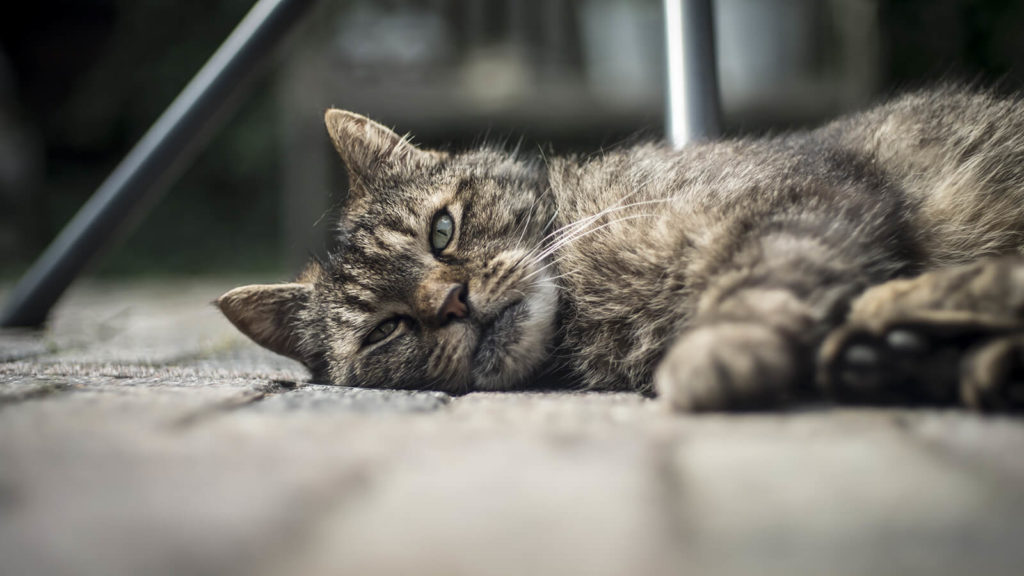Changes in Food Habits, Screeching , and Litterbox Woes
Cats are prone to many of the same the aches and pains that plague aging humans. Some conditions common in otherwise healthy older cats are blindness, hearing loss, and diminished sense of smell. These problems, which are a normal part of the aging process, may cause misunderstandings, frustration, and unexpected difficulties for the pet and its caretaker. Below are some suggestions for making an older cat happy, healthy and comfortable in his sunset years.
How Old is Your Pet?
There is an old adage that one human year is equivalent roughly to seven cat years. A more recent and believed to be more accurate formula estimates that the first year of a cat’s life is equivalent to about 15 human years, the second year, 9, and after that 4 years are added for each additional year.
Using this formula, a 12 year old cat is about 65, a 16 year old cat is 81. Cats usually don’t look their age. If you have a cat of 16 years or older, he deserves gentle treatment as he is definitely a senior citizen, prone to the same diseases such as arthritis, diabetes and thyroid trouble that humans often suffer from.
Changes in Food and Eating Habits
Veterinarians usually recommend a good brand of dry cat food for younger to middle-aged cats because it is better for their teeth. But when cats get to be fourteen or older, they often fare better with canned cat food. Canned cat food is more easily digestible for older cats. As they get up in years, their teeth can also get bad, which may cause difficulty eating dry food. If your older cat is losing weight or seems unhappy with his current food situation, try switching to canned food and see if it makes a difference.
Insecurity and Screeching
When cats get older, their eyesight and hearing may get worse, which makes them more insecure. They may want to keep their owner in ear and eye range. If a person goes from one room to the next, a cat is likely to follow and may become upset if their owner is not in sight. This is normal behavior for all cats, but especially older pets.
Older cats may surprise their owners by making a series of loud, high-pitched meows. This is fairly common in older cats, and may be caused by diminished hearing. Nothing can be done about this problem but reassuring the cat that he is not alone.
Litter Box Trouble
Older cats may start getting kidney problems and wetting the rug. This is a very difficult situation to deal with. There are a couple of things an owner can do to make the situation better. One is to make sure the cat doesn’t have a urinary tract infection. When cats get older they are more prone to these infections, and one of the symptoms is frequent urination. Another thing to check is to see if the cat has diabetes, which can also cause problems. If the cat is otherwise healthy, make sure to keep the litterbox clean. Try switching to a good brand of unscented litter. Sometimes a cat’s sense of smell gets weaker and this can make him have trouble finding the box if it is heavily scented.
There are some excellent products such as Zero Odor that will help if your cat has frequent accidents.
An indoor cat may live over twenty years; a few make it to thirty. Regular veterinary appointments to check for such diseases as diabetes are recommended. With proper care, an indoor cat can live a long and healthy life.
Find the best Pets & Pet Care webshops
Warehouse Aquatics
- Delivery time: 2-5 days
- Return period: 30 days
- Free delivery from £49
Doggie Solutions Ltd
- Express Delivery Available
- Delivery time: 3-5 days
- Delivery Cost: £ 3.99
- Return period: 14 days
- Free delivery from £40
Dog Chews Store
- Delivery time: 3-5 days
- Return period: 30 days
- Free delivery !
Swell Reptiles
- Delivery time: 1-2 days
- Delivery Cost: £ 3.49
- Return period: 60 days
- Free delivery from £59
Christies Direct
- Delivery time: 2-3 days
- Return period: 14 days
- Free delivery from £100
Not In The Dog House
- Express Delivery Available
- Delivery time: 1-3 days
- Delivery Cost: £ 3.99
- Return period: 14 days
- Free delivery from £35
Essential Foods
- Delivery time: 4 days
- Free delivery !
Swell UK
- Delivery Cost: £ 4.95
- Return period: 60 days
- Free delivery from £49
Lily's Kitchen
- Express Delivery Available
- Delivery time: 1-3 days
- Delivery Cost: £ 4.95
- Return period: 14 days
- Free delivery from £29
Pet by Waitrose & Partners
- Express Delivery Available
- Delivery Cost: £ 3.95
- Return period: 14 days
- Free delivery from £40
Barkings Heads & Meowing Heads (Dog and Cat food)
- Delivery time: 2-3 days
- Delivery Cost: £ 4.99
- Return period: 30 days
- Free delivery from £30
Cooper and Gracie
- Delivery time: 3 days
- Return period: 90 days
- Free delivery from £25
zoohit SI
- Delivery time: 1-3 days
- Delivery Cost: £ 3.99
- Return period: 14 days
- Free delivery from £35
Monster Pet Supplies
- Express Delivery Available
- Delivery time: 2-5 days
- Delivery Cost: £ 3.99
- Return period: 30 days
- Free delivery from £35
Pet Supermarket
- Express Delivery Available
- Delivery time: 2-3 days
- Delivery Cost: £ 2.99
- Return period: 14 days
- Free delivery from £29
Pooch and Mutt
- Return period: 14 days
- Free delivery from £39.99
Zooplus.co.uk
- Delivery time: 1-3 days
- Return period: 14 days
- Free delivery from £35

